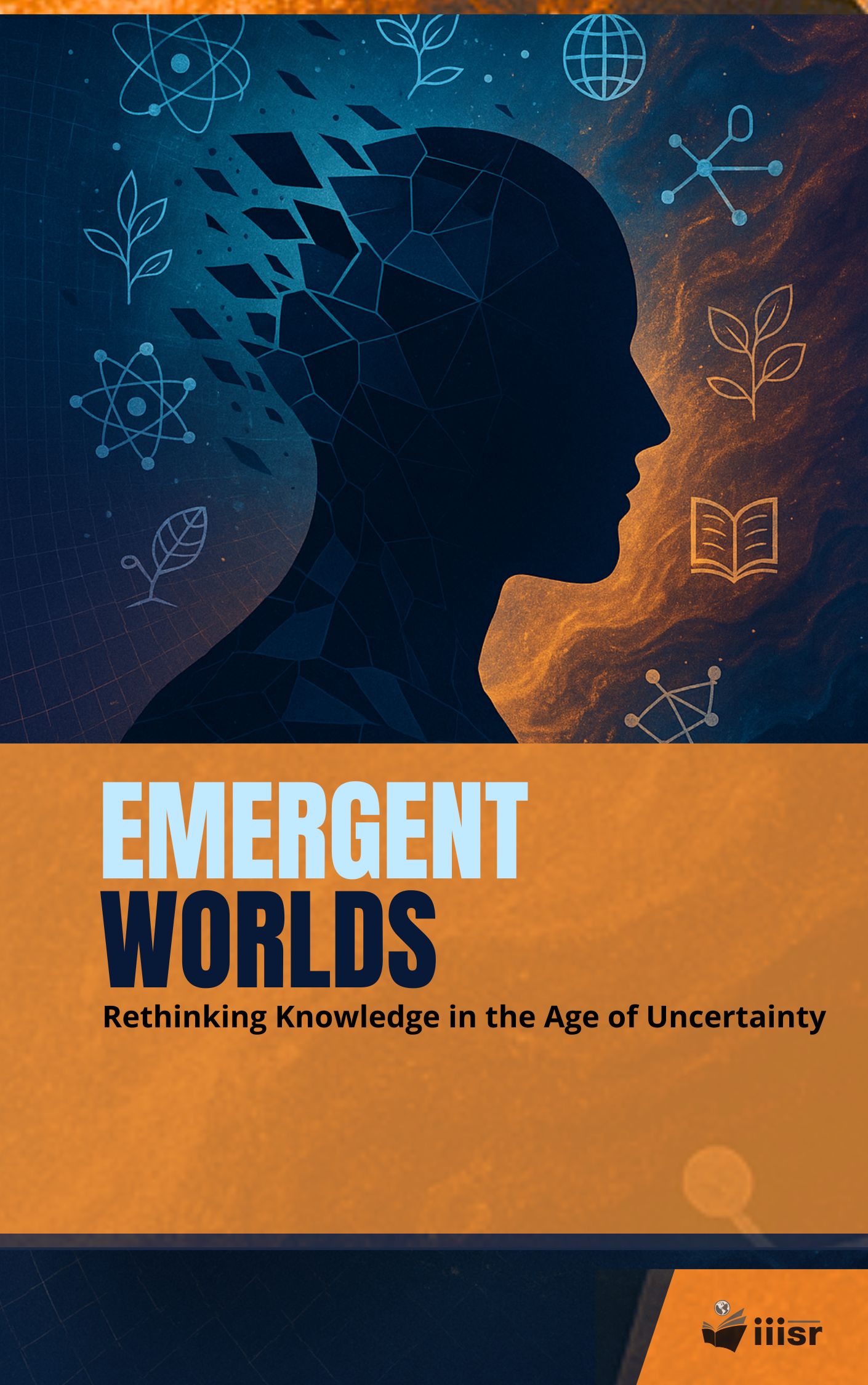Ecologies of Ignorance: Climate Change and the Politics of Not-Knowing
Authors: Arun, P. N.
| Open Access |
This chapter explores the concept of ‘ecologies of ignorance’ in the context of climate change. It argues that ignorance is not merely a lack of knowledge, but an actively produced and maintained condition that shapes climate discourse and governance. The chapter examines how uncertainty, denial, and strategic silence function as mechanisms to maintain power structures and delay climate action. It challenges dominant epistemologies, emphasizing the need for epistemic pluralism and recognition of diverse forms of environmental knowledge. The chapter also discusses the implications for policy, education, and activism, calling for a critical address of structures perpetuating selective ignorance in climate change discussions.
Cite this chapter:
Arun, P. N. (2025). Ecologies of Ignorance: Climate Change and the Politics of Not-Knowing. In Emergent Worlds: Rethinking Knowledge in the Age of Uncertainty (pp. 92-107). Indian Institute of Industrial and Social Research. ISBN: 979-8-289-58863-0
References
Ahmed, R., Kabeel, A. A., & Mohammed, M. A. (2022). Characterization of tunable Ultra-Wideband Square Microstrip antenna with several gaps. 1–6. https://doi.org/10.1109/itc-egypt55520.2022.9855686
Alaszewski, A. (2023). Introduction: risk as a key feature of late modern societies (pp. 1–8). policy. https://doi.org/10.1332/policypress/9781447365242.003.0001
Bain, Z. (2022). On the Relation Between Ignorance and Epistemic Injustice (pp. 47–60). routledge. https://doi.org/10.4324/9781003100607-7
Beiter, K. D. (2023). Access to scholarly publications in the global North and the global South-Copyright and the need for a paradigm shift under the right to science. Frontiers in Sociology, 8. https://doi.org/10.3389/fsoc.2023.1277292
Céspedes, L., Fleerackers, A., & Maggio, L. A. (2024). “Giving them the best information I could with whatever I had at hand”. Physicians’ online health communication practices in a post-normal science context. Journal of Science Communication, 23(06). https://doi.org/10.22323/2.23060204
Chang, J., Seetharam, K., & Sharma, M. (2021). An interview with Professor Sheila Jasanoff: On lessons from science, technology, and society. MIT Science Policy Review, 2. https://doi.org/10.38105/spr.n9a0lhvw2b
Cherkashyna, T. (2023). UKRAINIAN AUTOFICTIONAL NOVEL OF THE 1990S AND EARLY 2000S. Humanities Science Current Issues, 3(65), 193–198. https://doi.org/10.24919/2308-4863/65-3-30
Crowley, J. (2023). Environmental Humanities (pp. 43–65). cambridge university. https://doi.org/10.1017/9781108769327.004
Das, S. C. (2022). The Sundarbans: Sustainable tourism, livelihoods and economies involving Bangladesh and India. International Journal of Business & Economic Development, 10(01). https://doi.org/10.24052/ijbed/v010n01/art-03
Dasgupta, K., Panofsky, A., & Iturriaga, N. (2024). Racist Agnotology: How Myth-Making about Institutions and Knowledge Production Contributes to Racialized Ignorance. Sociology of Race and Ethnicity, 11(2), 191–206. https://doi.org/10.1177/23326492241259403
Deane, S. (2022). Rethinking Agency: Addressing the Complexity of Gun Violence and Education. Educational Theory, 72(1), 47–64. https://doi.org/10.1111/edth.12512
Dey, S. (2022). Political Ecology and Science and Technology Studies (pp. 91–100). routledge india. https://doi.org/10.4324/9781003301950-4
Dong, Y.-W. (2023). Aquaculture Mapping in the Context of Climate Change (pp. 473–490). springer nature singapore. https://doi.org/10.1007/978-981-19-5486-3_14
Ford, A. (2025). Slippery Knowledge: Ignorance, Ecologies, and Environment in Endometriosis Framing. Medical Anthropology Quarterly. https://doi.org/10.1111/maq.70002
G, D. D. (2024). Converging Storms: Exploring The Complex Interplay Between Climate Change and Public Health (pp. 109–122). iterative selfypage developers pvt. https://doi.org/10.58532/v3bfms9p1ch14
Gilchrist, G. M. (2020). Willful Blindness as Mere Evidence. SSRN Electronic Journal. https://doi.org/10.2139/ssrn.3690351
Graham, K. M., Griswold, A., Frazer, H., Arthur, A., Nagahawatte, J., Kitteringham, E., & Klade, Q. (2022). Slave Narratives and Epistemic Injustice. Social Philosophy Today, 38, 83–97. https://doi.org/10.5840/socphiltoday202292297
Haider, J., & Rödl, M. (2023). Google Search and the creation of ignorance: The case of the climate crisis. Big Data & Society, 10(1), 205395172311589. https://doi.org/10.1177/20539517231158997
Handy, T. (2024). Disrupting Durabilities of Colonial Logics in the Field of Special Education: Toward Abolitionist Futures. Teachers College Record: The Voice of Scholarship in Education, 126(8), 63–95. https://doi.org/10.1177/01614681241276949
Hanson, J. (2023). Looking beyond climate contrarianism: nationalism and the reterritorialization of climate discourse in Spain’s Vox party. Nordia Geographical Publications. https://doi.org/10.30671/nordia.121511
Haque, R., Parr, N., & Muhidin, S. (2020). Climate-related displacement, impoverishment and healthcare accessibility in mainland Bangladesh. Asian Population Studies, 16(2), 220–239. https://doi.org/10.1080/17441730.2020.1764187
Hossain, M., Saha, S., Saha, C., Ahmed, M., Ahmed, T., Sikder, A. H. F., Islam, H. M. N., & Billah, M. M. (2024). Is the Sundarbans of Bangladesh in a State of Pollution? Open Journal of Forestry, 14(01), 19–41. https://doi.org/10.4236/ojf.2024.141002
Ito, H. (2017). COMPARATIVE ANALYSIS OF NEW GEOMATERIALS AND EMBANKMENT CONSTRUCTION METHODS CONSIDERING RECYCLING. International Journal of GEOMATE, 13(35). https://doi.org/10.21660/2017.35.6650
James, J. W. (2017). Strategic Denial and Deception. routledge. https://doi.org/10.4324/9781315130316
Karlsson, B. G. (2018). AFTER POLITICAL ECOLOGY. Anthropology Today, 34(2), 22–24. https://doi.org/10.1111/1467-8322.12422
Kobayashi, K. (2021). Heuristic and systematic processing differentially influence the effects of scientific consensus messaging on perceived scientific consensus. Current Psychology, 41(11), 7742–7750. https://doi.org/10.1007/s12144-020-01275-1
Kourany, J. A. (2020). Science and the Production of Ignorance. massachusetts institute of technology. https://doi.org/10.7551/mitpress/12146.001.0001
Krishna Pasupuleti, M. (2024). Public Policy Implementation: Insights from Political Science and Public Administration (pp. 87–94). National Education Services. https://doi.org/10.62311/nesx/22607
Launer, J. (2020). The production of ignorance. Postgraduate Medical Journal, 96(1133), 179–180. https://doi.org/10.1136/postgradmedj-2020-137494
Le Morvan, P. (2021). Ignorance, Knowledge, and Two Epistemic Intuitions. Philosophia, 49(5), 2123–2132. https://doi.org/10.1007/s11406-021-00342-6
Loiko, A. I. (2022). Geopolitical Dynamics of Greater Eurasia. Вестник Удмуртского Университета. Социология. Политология. Международные Отношения, 6(3), 353–358. https://doi.org/10.35634/2587-9030-2022-6-3-353-358
Lustiyati, E. D., Rusyani, Y. Y., Untari, J., & Pasca Wati, N. A. (2023). Environmental ignorance behaviour index (EIBI) of the student organization member at Universitas Respati Yogyakarta. MEDIA ILMU KESEHATAN, 12(1), 12–20. https://doi.org/10.30989/mik.v12i1.830
Meissner, S. N., & Huebner, B. (2022). Outlaw epistemologies: Resisting the viciousness of country music’s settler ignorance. Philosophical Issues, 32(1), 214–232. https://doi.org/10.1111/phis.12229
Mickel, A. (2015). Reasons for Redundancy in Reflexivity: The Role of Diaries in Archaeological Epistemology. Journal of Field Archaeology, 40(3), 300–309. https://doi.org/10.1179/2042458214y.0000000002
Moustafa, T. (2022). Political Science at the NSF: The Politics of Knowledge Production. PS: Political Science & Politics, 55(2), 335–340. https://doi.org/10.1017/s1049096521001487
Nenmini Dileep, V. (2022). Climate Change and Global Health Governance in Relation to the Global South and the Global North. Nuovi Autoritarismi e Democrazie: Diritto, Istituzioni, Società (NAD-DIS), 4(2). https://doi.org/10.54103/2612-6672/19467
Nulman, E. (2021). Climate change movements in the Global North (pp. 185–198). routledge. https://doi.org/10.4324/9780367855680-15
O’Brien, K., & Milkoreit, M. (2022). Climate Politics and Social Change (pp. 127–152). oxford university. https://doi.org/10.1093/oso/9780197568200.003.0007
Oberthür, S., Hermwille, L., & Rayner, T. (2021). A sectoral perspective on global climate governance: Analytical foundation. Earth System Governance, 8, 100104. https://doi.org/10.1016/j.esg.2021.100104
Parr, A. (2021). The Gender-Climate-Injustice Nexus (pp. 474–483). oxford university. https://doi.org/10.1093/oxfordhb/9780190628925.013.39
Peels, R. (2023). Asserting Ignorance (pp. 265–288). oxford university pressnew york. https://doi.org/10.1093/oso/9780197654514.003.0012
Piechota, T. C., Schneider, J. M., & Garbrecht, J. D. (2005). Climate Variability and Climate Change (pp. 1–18). american society of civil engineers. https://doi.org/10.1061/9780784408247.ch01
Pongiglione, F., & Martini, C. (2022). Climate Change and Culpable Ignorance: The Case of Pseudoscience. Social Epistemology, 36(4), 425–435. https://doi.org/10.1080/02691728.2022.2052994
Pusceddu, A. M. (2021). Political ecologies of value (pp. 156–174). routledge. https://doi.org/10.4324/9781003036265-12
Pusterla, E. R. G. (2024). Deconstruction at the Time of Post-Truth Politics. Subjectivity, 31(4), 366–385. https://doi.org/10.1057/s41286-024-00204-y
Rudow, L. B. (2020). Environmental Ignorance. Radical Philosophy Review, 23(2), 299–329. https://doi.org/10.5840/radphilrev2020721113
Samson, K. (2020). Events and Ecologies of Design and Urban Activism (pp. 202–216). routledge. https://doi.org/10.4324/9781351187992-15
Sormunen, M. (2023). Rethinking Effective Remedies to the Climate Crisis: a Vulnerability Theory Approach. Human Rights Review, 24(2), 171–192. https://doi.org/10.1007/s12142-023-00686-4
Sturman, A., & Quénol, H. (2023). Natural Ecosystems. oxford university. https://doi.org/10.1093/hesc/9780198807506.003.0006
Tshikororo, M., Thaba, K., Nefale, T. A., & Tshikororo, M. (2021). Perception Driven From Farmers’ Socio-economic Characteristics Towards Tackling Climate Change. Journal of Agricultural Science, 13(6), 41. https://doi.org/10.5539/jas.v13n6p41
Tsopmo, P. C., Ekila Elanga, M. J., & Foudjo, S. I. (2022). Climate vulnerability and government resource mobilization in developing countries. united nations university world institute for development economic research. https://doi.org/10.35188/unu-wider/2022/286-7
Većkalov, B., Nardin, V., Löloff, J., Bat, B., Roh, A., Broyles, M., White, M., Farahat, E., Akin, B., Shavgulidze, M., Schmidt, J., Rutjens, B. T., Pohl, F., Linden, S. V. D., Natarajan, D., Newman-Oktan, S., Bartoš, F., Joustra, S., Ruggeri, K., … Jordan, G. (2023). A 27-country test of communicating the scientific consensus on climate change. center for open science. https://doi.org/10.31219/osf.io/bctm3
Vendramin, V. (2020). The Grammar of Knowledge: A Look at Feminism and Feminist Epistemologies. Šolsko Polje, 31(5–6), 139–146. https://doi.org/10.32320/1581-6044.31(5-6)139-146
Zhang, J., Zhao, S., Guan, K., Fu, R., Peng, B., & Zhuang, Y. (2023). Evaluating Seasonal Climate Forecasts from Dynamical Models over South America. Journal of Hydrometeorology, 24(4), 801–814. https://doi.org/10.1175/jhm-d-22-0156.1
Zimmerman, M. J. (2022). The Argument from Ignorance (pp. 3-C1.F2). oxford university pressoxford. https://doi.org/10.1093/oso/9780192859570.003.0001

